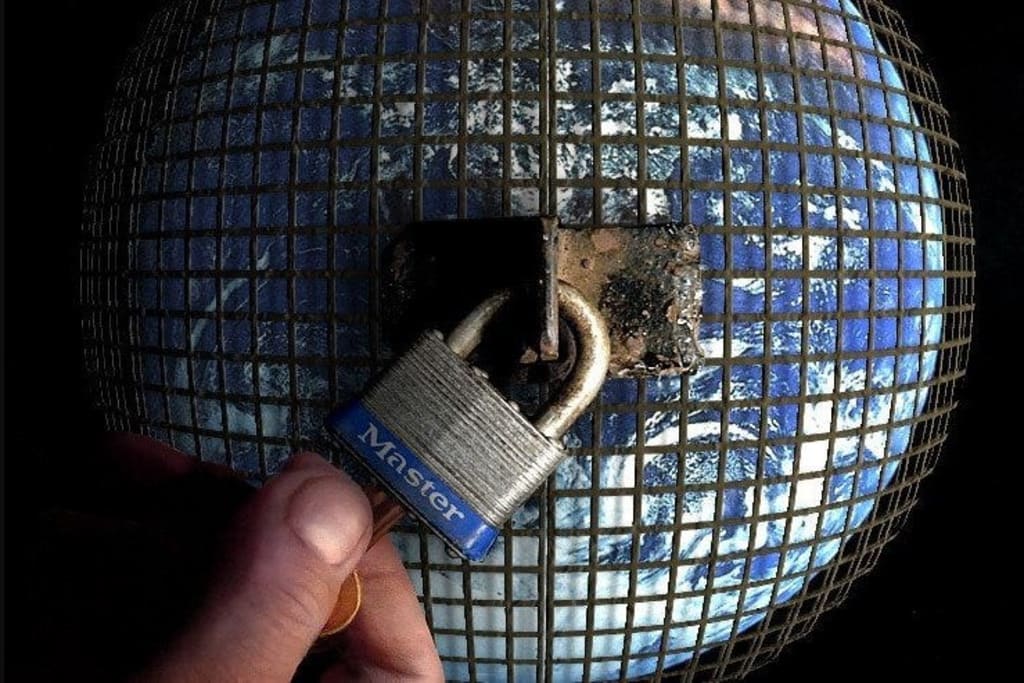IS THIS ACTUALLY A PRISON?
What If The World is Actually a Prison?

What if the entire globe is a massive prison? The nineteenth-century philosopher Arthur Schopenhauer concluded that what we seek is not happiness and pleasure but a lessening of the continual suffering that is a necessary component of existence after observing how much misery we endure throughout our lives. Schopenhauer compares the real world to a jail, or more particularly, to a prison, and when viewed through the somber lens of his philosophy, we start to find some startling parallels. No one (in general) wants to be here, just like in prison. We're constrained by the walls of time pressing in on us as each day draws us closer to death; we can't leave until our term of imprisonment expires or unless we 'end' it ourselves; and within the constraints of our limitations, we typically encounter a torrent of sorrow, tragedy, worry, and unhappiness. We desperately switch between pleasures to temporarily numb our suffering. In the process, the Earth's inhabitants feed on one another to survive, motivated by what Schopenhauer dubbed the "will-to-live" to extend their unhappy lives somewhat. The organisms of the Earth are involved in a constant struggle for domination, much like prison gangs. When we consider how plants and some creatures only serve as food for other species, which then perish due to the harmful presence of humans, it appears that "eat or be eaten" is the natural order of things. As a result of exploiting its people and depleting the resources in its natural home, humanity eventually succumbs to a sickness or natural calamity. We can begin to doubt, as Schopenhauer does, the notion that, quote, "this world is the effective creation of an all-wise, all-good, and at the same time, all-powerful Being." when We lift the curtain of ignorance and see the harsh reality we live in. Quote completed. Schopenhauer's perspective on the world is one of suffering, devoid of divine grace, and it resembles a "penal colony" much more than the conception of a benevolent deity. Now, viewing the world as a jail seems like a prescription for personal suffering. Why not embrace a more upbeat, cheerful viewpoint? Why take such a negative stance toward it? Schopenhauer's concept does, however, include a catch. His negative vision has a perspective that could be highly helpful to humanity. This film investigates Schopenhauer's gloomy outlook on life and shows a secret to be gleaned from it. It is based on the work On the Sufferings of the World.
Schopenhauer argued that, contrary to popular belief, the positive aspect of existence is not pleasure but misery. He claimed that evil has a good effect because it causes others to notice it. On the contrary hand, good is negative because it just involves the elimination of a disturbance. Nothing more than a goal realized or the cessation of suffering may be considered the condition of happiness and contentment. Therefore, the cause of our needs and aspirations is the experience of suffering. For instance, hunger is an uncomfortable condition that can become unpleasant and makes us need food. Therefore, eating is not a joyful experience; it only feels good because it satisfies a craving for pain or a sense of deprivation. Schopenhauer believed that in this world, suffering much outweighs joy. And the enjoyment we experience is frequently less enjoyable than anticipated, while the agony is significantly more agonizing. To determine which of the two exceeds the other, we merely need to consider an animal that is eating another animal and evaluate the pleasure of eating against the misery of being eaten. Schopenhauer describes life as a failure and a scam. Age often makes life more unbearable since we encounter tragedy after catastrophe and are more likely to get sick and die. Even if life is a series of unfortunate events, the world always seems hopeful while we're young and idealistic. But ultimately, all of our lofty expectations fade, and we find ourselves bitterly disillusioned by the trials that have befallen us. Insecurity, abandonment, poverty, physical suffering, and perhaps even the loss of reason are all present. Then we understand that life isn't all sunshine and rainbows and that happily ever afters are rare: the dream home, the substantial savings, or an intriguing social circle are no comfort for the immeasurable suffering that comes with being stranded on this barren rock of doom known as Earth. If anything, having all we desire and constantly stifling our cravings via pleasure results in monotony, another sort of discontent.
Schopenhauer's perspective of the universe forbids optimism: Life is a burden; it's "the result of some wrong step, some sin of which we are paying the penalty," it probably would have been better if it hadn't even happened. Suppose you try to imagine, as accurately as you can, the amount of misery, pain, and suffering the sun shines upon throughout its course. In that case, you will realize that it would be much better if the sun could only call forth the phenomena of life on the moon and the Earth and if the surface was still crystalline. Quote completed. Schopenhauer likens us to sheep in a field being watched by a butcher who chooses the next victim. We have no control over our fate and are confined by life as we wait for the next setback to strike. Some people decide to check out early to break free from this cycle of sorrow. Others keep doing what they've always done: finding pleasure to console themselves. To avoid being overtaken by fears about the wrong things yet to come, we drink to forget about our past sorrows and engage in diversions. As prisoners, we endure our punishment while trying to keep the agony to a minimum. Schopenhauer urges us to accept this reality, even though it may sound depressing. You cannot train yourself to view this world as a prison, a sort of penal colony, if you want a reliable compass to lead you through life and to dispel any uncertainty about how to view it.
Looking around, we notice rivalry, intolerance, and even hatred for certain people and groups. Therefore, even though life is already challenging enough, we continue to make it even worse for one another. Instead of being our allies, we've turned into one other's sources of pain. We have no patience for the bad things that other people do. We despise our opponents because they harm us. We judge individuals who make mistakes too harshly. But isn't this hostility pointless if, in the end, we all suffer from the same tragic fate: being alive, being human, and being a part of a world that's stacked against us and shares a lot in common with a prison? They are the flaws of mankind, to which we belong, flaws that we all share, even the ones that we now find so offensive simply since they have not yet manifested in ourselves. They are flaws that are not visible at first glance. However, they exist in the depths of our nature, and should anything summon them, and they will emerge and manifest themselves as we do with others today. Quote completed. We can adjust our expectations if we accept this perspective on life and understand that we all experience the same worries, uncertainties, grief, physical pain, and restlessness since we are all a part of the same terrible existence. The events typically seen as "bad" are neither unique nor unexpected; they are the logical outcomes of a life centered on tragedy.
For instance, when someone is unpleasant, we might consider the hardships they have experienced in life and realize that their rudeness is to be anticipated and that we shouldn't take it personally. They are inmates just like us, awaiting the next guardsman beating and their execution. So it's understandable that people aren't always acting appropriately unless they've overcome the misery of life. Schopenhauer notes that his pessimistic outlook offers the chance for compassion along with acceptance. The key lies in this. The capacity to feel sympathy and care for the pain or plight of others is known as compassion. We can confidently assert that compassion is the best response for everyone who participates in this institution, given the quantity of suffering that life entails and the reality that no one has ever decided to be here.
Additionally, Schopenhauer believed that because compassion is crucial to our well-being, we owe it to one another as humans. We've chosen to change how we see each other: not as enemies but as, as Schopenhauer put it, "fellow-sufferers," and it shows in our willingness to help one another out, our capacity to accept another person's flaws, and our tendency to make this collective sentence of imprisonment more bearable. This may seem strange, but it is true; it casts others in a favorable light, and it serves as a reminder of what is ultimately most important in life: the tolerance, endurance, regard, and affection of neighbor, which everyone needs and which, as a result, each man owes to his fellow.
About the Creator
Ian Sankan
I am a writer with proven writing ability in various fields. I consider writing a passionate career and a platform through which I extend my intellectual ability.






Comments
There are no comments for this story
Be the first to respond and start the conversation.